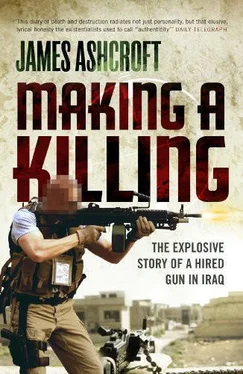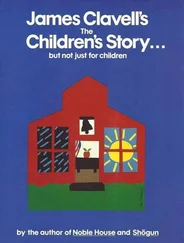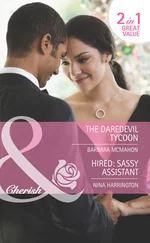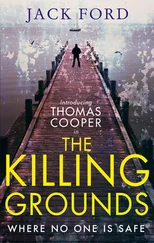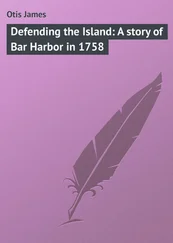I slipped away while Krista was still sleeping, caught the Tube to Heathrow and flew to Amman. I went through my own little ritual, dinner in the Library, a few drinks at the Sports Bar, then an early morning drive across twelve hours of desert back to Baghdad.
The office block and training classrooms that had been under construction before I left had been completed in my absence. As the last one in, I found that I had the least amount of space and was sharing my office with Sammy, which meant he had the pick of all the cheap gifts that I had bought for our Iraqi staff. The first evening back I handed out these Christmas presents.
‘No point waiting for the day, is there? One of you lot might be dead by then.’
I had also brought back a stack of running and cycling magazines for Seamus and Les and 200 cigarettes for Dai. By the time I’d unpacked my kit, adjusted my pistol holster and popped out to the kitchen for a plate of roast lamb, London was just a vague memory. This was real life again.
It is common in areas where there are embassies or rich officials to have guard posts at the end of the street, perfect for keeping ali-babas from digging up the electricity cables and preventing the kidnapping and criminal activities of rival tribes. We ran the idea by the elders and they nodded perceptively as they saw the value of their properties increasing as we took the neighbourhood upmarket in this way. We constructed two posts with concrete barriers, one at each end of the street. The guards knew everyone and the local people passed in and out without hindrance.
We then contacted the nearest Coalition unit to inform them that we were in their area employing local guards, a vital precaution or they would drive by on patrol at night, see our guys sitting about with AKs, assume they were terrorists and zap them. Although our guards were not members of the FPS (Facilities Protection Service), the FPS brassards with Iraqi flags were the most widely recognised by the CF and we enlisted Ibrahim’s special skills to acquire some similar-looking ones for us.
Working on the house in this way was satisfying and occasionally tedious. We really did begin to feel like members of the community and exchanged pleasantries when our neighbours dropped by to report ‘bad men up to mischief’, or to complain that the power had failed in the middle of the latest episode of Baywatch .
The CPA (i.e. the American taxpayer) had paid for us to set up the house and was paying our salaries and expenses, which relieved Adam and Angus of the burden of seeking tasks for us. As part of the contract, the CPA would be supplying transport and weapons for an initial manning requirement of 300 men. We had put in an order for fifty vehicles, of which thirty would need to be 4 × 4s to visit pumping stations in the desert. The other twenty runarounds were for the city.
The cost of 50 vehicles at a modest price of $20,000 each is a simple sum: 50 × 20,000. That is $1 million. We would need to buy 300 weapons at $400 each ($120,000), plus ammo and uniforms ($100,000) and pay the guards $150 a month each◦– $45,000 every month and rising. And don’t even get me started on fuel for the vehicles, spare tyres, air filters and other consumables. Office equipment, computers, air conditioners and office staff would also take out a huge chunk of cash. For our professional services, Spartan charged the CPA $1,000 a day per man: about $1.3 million a month.
If you multiplied our team of eight by the several teams at Spartan, then multiply that by the 50 or more private companies comprising the 25,000 private security contractors◦– that’s not counting the 100,000 civil contractors with KBR, who were earning even more than us◦– it was hardly surprising that the first $87 billion for the reconstruction of Iraq granted by Congress was running out and Mr Bush was asking for more. He’d get it, too.
The Brits knew how to manage a budget and we knew we’d be doing our own legs if we didn’t spend every penny that came into the villa. If we gave money back to Phil Rhoden, the accountant, when we didn’t need it, it would be a devil of a job getting it back again when we did.
I thought about Krista as Seamus said: ‘One thing we do have to do and that’s spend, spend, spend.’
We clinked cans and tore off lamb from the braii .
Every morning we held what we called morning prayers, a team meeting to decide the day’s order of business. We each gave an update on our tasks and status to Seamus. Seamus decided to acquire new Western weapons and duly sent Ibrahim out to Sadr City to find them. It would have been better to have gone ourselves◦– you wouldn’t buy a pair of shoes without trying them on◦– but Sadr City was a no-go area where American patrols came under attack every day of the week.
Although we were living in Aradisa Idah, Karrada was known by some (don’t ask who) as the Fifth Avenue of Baghdad and that was our destination as we pulled out of the courtyard in a two-car packet with a shopping list as long as your arm. We needed to stock up and spend that reconstruction money.
We took the main Karrada high road towards the 14 thof July Bridge, which crossed into the Green Zone, turned off halfway along the road, and parked on the street outside what was generally considered the best supermarket on the block, a place that had been frequented by aid workers, the press and the Japanese before the spate of bombings including the one that killed Jacko.
Two men stayed with the cars. Etienne sat with the engine running, Les stood guard. It was arranged this way so if anything happened we could bug out in one set of wheels. Seamus and Wayne stayed outside the entrance, watching the street, weapons ready to put down a shitload of fire if the need arose. With our longs in the car and our pistols inconspicuously in our belts, Hendriks and I pushed three trolleys up and down the four short aisles like a pair of housewives.
You could get just about anything, sometimes brands you were familiar with but packaged in strange ways, made under licence or just made in the Middle East with phoney labels. There was recognisable toothpaste and corn flakes, Gillette razors of the type that were going out of date at about the time I was learning to shave in the eighties. We bought toiletries, shower gel, some lacquer for Sammy so he could keep his hair glued over his bald spot. I found Orange Pekoe and Earl Grey tea. Les had on the list ‘Irish Breakfast Tea’ and was distraught when they didn’t have any. We gathered up armfuls of chocolate; Mars, KitKat and Twix, all the same names, all slightly different like something seen in a distorting mirror. I was thrilled to find frozen chicken after all that bloody lamb. Frozen and tinned vegetables. Cases of tinned fruit.
The off-licence further down on another road was signposted by a stack of crates in the street outside. You could buy any brand of spirits and most beers. You pointed to what you wanted, the ‘licensee’ would load up the vehicle and we’d remain seated, engine running with weapons pointing in every direction. Pity the poor ali-baba who tried to take Dai’s bottle of Jack Daniels.
At each stop a swarm of kids would appear selling cigarettes and old AK bayonets LaLaLa … no, thank you, we’d say, and we’d toss them our dinars. We paid for everything in dollars, but received change in the Iraqi dinar. There had been inflation before the war and since the invasion it had begun to spiral out of control. Local people paid for everything in bricks of money held by elastic bands. In the supermarket there was a money-counting machine, but most traders didn’t count the money, they’d just feel the thickness of a block of currency and shove it under their dish-dash.
The dollar bills that came to us were always in fifties. If we spent $203 at the supermarket, we’d hand over five bills and receive a supermarket bag full of blocks of dinars in change. The rate of exchange ranged from about 1,000 to 3,000 dinars and was finally fixed at something like 1,450 dinars to the dollar. All this meant that, like private security guards, every Iraqi with a new satellite dish tuned in to CNN to check the international currency rates and the price of a barrel of oil.
Читать дальше
